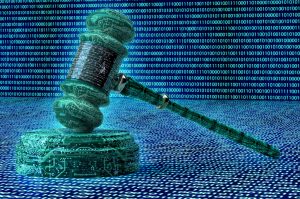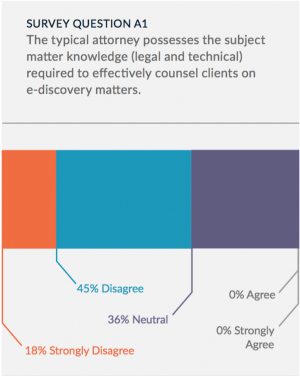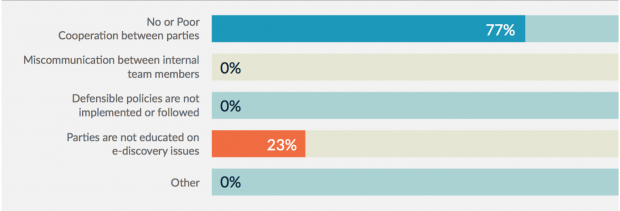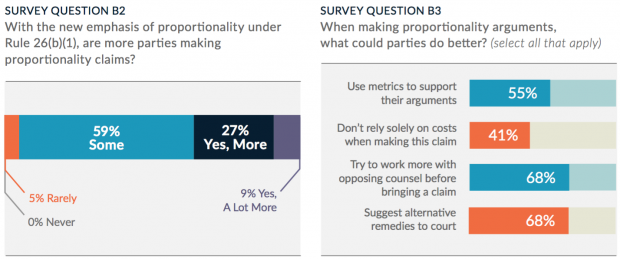Federal Judges Sound Off On Discovery
Federal judges are sick and tired of having to resolve all your discovery disputes because you can't settle them on your own like grown-ups.
 Everybody thinks their little discovery turf war presents unique challenges that only they fully understand. They trade nasty letters and sit through contentious conference calls only to end up bringing their one-of-a-kind e-discovery spat before a federal judge to settle. And this must drive judges judges — especially magistrate judges — absolutely crazy.
Everybody thinks their little discovery turf war presents unique challenges that only they fully understand. They trade nasty letters and sit through contentious conference calls only to end up bringing their one-of-a-kind e-discovery spat before a federal judge to settle. And this must drive judges judges — especially magistrate judges — absolutely crazy.
Because you do not have a unique and beautiful discovery dispute. It’s not the 90s anymore — the judge has heard some variety of your issue a hundred times before, and really can’t stand you wasting everyone’s precious time with a full hearing to resolve something so straightforward.
That’s where Exterro’s third annual survey of federal judges comes in — giving a voice to the federal jurists who have to silently scream in their chambers every time you muck up their calendar with discovery fights.

Legal AI: 3 Steps Law Firms Should Take Now
The survey asked 22 federal judges a wide-array of questions about e-discovery and the changes to the FRCP designed to improve the process, and then compiled the data and analysis from the results, plus expert commentary on the results from judges, in-house attorneys, and law firm practitioners.
The verdict is, by and large, that judges aren’t happy with practitioners:

“Hey, do you think lawyers have a clue? Hm. No takers. No takers at all?”
Sponsored

Early Adopters Of Legal AI Gaining Competitive Edge In Marketplace

The Business Case For AI At Your Law Firm


Legal AI: 3 Steps Law Firms Should Take Now

Navigating Financial Success by Avoiding Common Pitfalls and Maximizing Firm Performance
Zero. Zero respondents could agree or strongly agree with the proposition that lawyers are capable of effectively counseling their clients on e-discovery. Take a second to appreciate what an epic failure that is for the profession. Technology moves fast, but it’s been at least 15 years since we started down the “let’s get e-discovery figured out” road. And these judges think lawyers still aren’t capable of counseling clients on the issue.
As for your personal discovery battle…

Why can’t we all just get along? It’s possible the judges are overestimating the likelihood of a bunch of lawyers coming together and agreeing on anything. Why make peace when a definitive answer is just a trip to the courthouse and thousands of billable hours away?
But judges still want parties to try. It’s the motivation behind recent changes to the FRCP introducing “proportionality” and “reasonable steps” language to prod attorneys into seeing discovery as a something to collaborate over. As Geoffrey Klingsporn writes in the survey:
Sponsored

Navigating Financial Success by Avoiding Common Pitfalls and Maximizing Firm Performance

Is The Future Of Law Distributed? Lessons From The Tech Adoption Curve
Judges do not wish to decide what is “proportional” in a specific case any more than they care to resolve any other kind of discovery dispute, and so place that burden on the parties in the first instance, to cooperatively discuss and agree on proportionality early and often.
Unfortunately, this seems to have just given lawyers one more word to litigate in front of the judges.

And it’s likely there will be more claims as the caselaw expands. The interesting if unsurprising finding is that the one thing judges want as much as the parties to settle the matter themselves is a lawyer prepared to pose a ready-made solution. If you think you know the challenges of your case inside and out, then prove it by laying out something fair and expedient.
Meanwhile, the new “reasonable steps” language gets a lukewarm review from the judges.

The survey also notes that judges feel that most lawyers haven’t clued in to the provision allowing parties to send Rule 34 requests prior to the Rule 26(f) conference. It’s hard to foster more communication and collaboration when lawyers are failing to take the engraved invitation to communicate and collaborate out of the gate.
Maybe there’s just nothing judges can do to lead these horses to that water. Just don’t be surprised when the judge sports a sour look when you explain the unparalleled obstacles you face coming to an agreement with the other side.
 Joe Patrice is an editor at Above the Law and co-host of Thinking Like A Lawyer. Feel free to email any tips, questions, or comments. Follow him on Twitter if you’re interested in law, politics, and a healthy dose of college sports news.
Joe Patrice is an editor at Above the Law and co-host of Thinking Like A Lawyer. Feel free to email any tips, questions, or comments. Follow him on Twitter if you’re interested in law, politics, and a healthy dose of college sports news.







